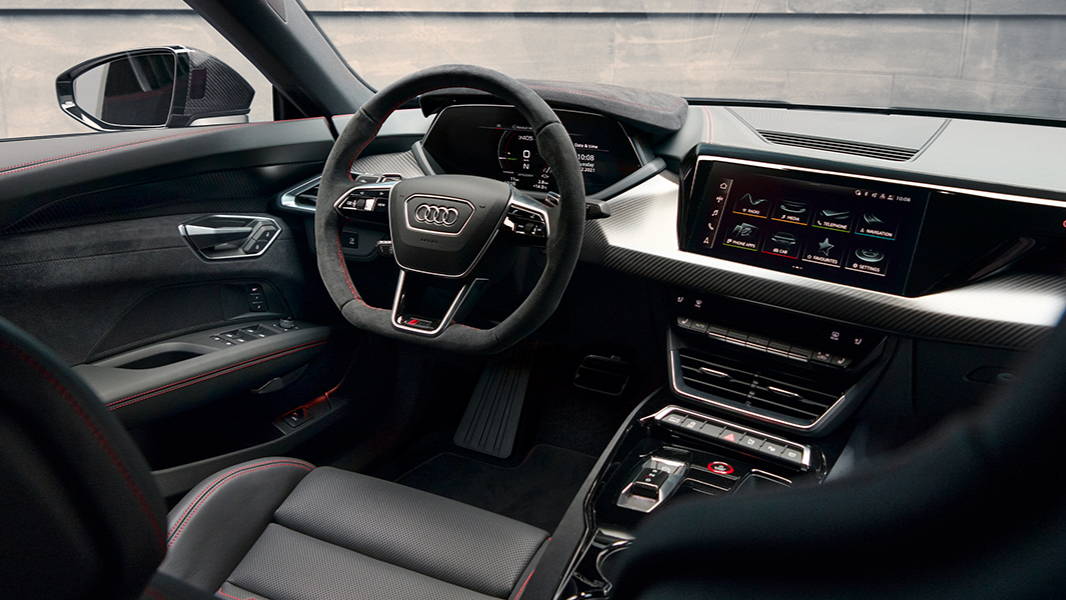
It's easy to think of electric vehicles (EVs) as quiet, sensible alternatives to power-hungry supercars, but Audi's new e-Tron GT aims to buck the trend by delivering genuine sustainability alongside raw, unmitigated performance.
The Audi e-tron GT and RS e-tron GT arrive as fully electric cars continue to gain a foothold in the automotive mainstream, with the German manufacturer looking to capitalize on the popularity of Porsche's first EV, the Taycan, by using similar technology in its latest high performance offerings.
Both e-tron GT models are four-door coupes powered by two electric motors (one on each axle) fed by an 800V, 93kWh battery. The two-speed transmission that boosts acceleration in the Porsche Taycan features here, too, meaning Audi's latest grand tourers are very, very fast.
- Everything we know about Tesla Model 3
- Mercedes reveals 56-inch 'Hyperscreen' for upcoming electric car
- Renault Clio E-Tech Hybrid review
The e-tron GT quattro comes with a horsepower of 476 (or 350kW), giving it a 0-62mph (0-100kph) acceleration of 4.1 seconds. The sportier RS e-tron GT can peak at 646 horsepower (or 440kW), clocking an even faster sprint time of 0-62mph in just 3.3 seconds – which, for reference, is about the same speed as a Ferrari 458. Not bad for a couple of sustainable EVs.
The unveiling of an icon. Meet the Audi RS e-tron GT. Discover more at https://t.co/PS4RNv0kmG #Audi #etronGT #FutureIsAnAttitude pic.twitter.com/hk5ahA81xaFebruary 9, 2021
Despite being powered by batteries rather than petrol engines, Audi says drivers can still expect an immersive audible driving experience in its new vehicles thanks to virtual sound systems – of the type we've come to expect in sportier EVs – which simulate authentic engine roars.
These synthesized sounds will be informed by data about the rotational speed of the electric motors, the load, the vehicle speed, and other parameters.
Both models will also feature adaptive air suspension, all-wheel-steering and locking rear differential to offer improved traction, as well as a driving range in excess of 295 miles (e-tron GT quattro) and 280 miles (RS e-tron GT), according to the company.
Get daily insight, inspiration and deals in your inbox
Sign up for breaking news, reviews, opinion, top tech deals, and more.
With great power...
In addition to an efficient powertrain, a leather free interior option is available using recycled materials, plus production is completely carbon neutral, says the company.
And boy, are they pretty to look at. The e-tron GT models share the assembly line with the Audi R8, and the muscular design of the manufacturer's flagship sports car seems to have rubbed off on the new EVs. Hell, Tom Hardy was at the Audi launch event, so they must look cool.

As you'd expect from Audi, the interior console is equally futuristic-looking. On the inside, the dash features a crisper interpretation of current Audi interiors with the central touchscreen placed higher than in previous models.
The virtual cockpit remains, tilted slightly towards the driver in what looks like a move to better show off the technological bells and whistles that seem customary of the manufacturer. Physical buttons for climate control have also returned.
The e-tron GT quattro and RS e-tron GT are set for simultaneous introduction sometime between March and May 2021, initially in Germany and then likely the rest of the world.
The e-tron GT quattro will be available from £79,900 (around $110,000 / AU$140,000), and the RS e-tron GT from £110,950 (around $150,000 / AU$200,000), but prices will vary depending on specification.
With the Tesla Model S – perhaps the e-tron GTs' most comparable competitor – starting at £73,990, Elon and co. could finally have a worthy EV opponent to contend with.
- Check out the digital mirrors on the Audi e-tron Sportback

Axel is TechRadar's UK-based Phones Editor, reporting on everything from the latest Apple developments to newest AI breakthroughs as part of the site's Mobile Computing vertical. Having previously written for publications including Esquire and FourFourTwo, Axel is well-versed in the applications of technology beyond the desktop, and his coverage extends from general reporting and analysis to in-depth interviews and opinion. Axel studied for a degree in English Literature at the University of Warwick before joining TechRadar in 2020, where he then earned an NCTJ qualification as part of the company’s inaugural digital training scheme.